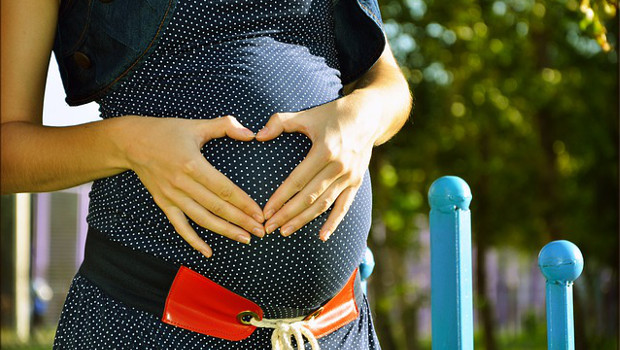by Jonathan Richter, DDS, FAGD
According to research from the Massachusetts Department of Public Health, in 2011 about two-thirds of  pregnant women had their teeth cleaned in the year prior to delivery, but approximately one-half had their teeth cleaned during pregnancy. While plenty of factors may keep pregnant women from visiting their dentist, some may avoid going because they are unsure if it’s safe.
pregnant women had their teeth cleaned in the year prior to delivery, but approximately one-half had their teeth cleaned during pregnancy. While plenty of factors may keep pregnant women from visiting their dentist, some may avoid going because they are unsure if it’s safe.
If you’re planning on becoming pregnant or suspect you’re already pregnant, it’s important that you see a dentist right away. Pregnancy may cause unexpected oral health changes due to hormones—particularly an increase in estrogen and progesterone, which can exaggerate the way in which gum tissues react to plaque. Research continues to show that overall health and oral health coincide, so it’s especially important for you to maintain good oral hygiene throughout your pregnancy. Visiting your dentist will allow him/her to assess your oral condition and map out a dental plan for the remainder of your pregnancy.
Not only are women more likely to have oral health problems when they are pregnant, but these oral health problems may lead to systemic health issues for mother and baby. Avoiding dental care is a
problem, because normal health changes during pregnancy cause women to have more gum disease, called periodontitis, and tooth decay. The growing womb presses on the stomach, which can cause heartburn or gastric reflux and result in softening or dissolving tooth enamel. Teeth with thin or weak enamel have a high risk of decay and are sensitive to cold food and drink.
In addition, during pregnancy increased hormone levels cause gums to be more sensitive to bacterial plaque that normally forms on teeth. When plaque isn’t removed, it can cause gingivitis—red, swollen, tender gums that are more likely to bleed. So-called “pregnancy gingivitis” affects most pregnant women to some degree and generally begins to surface as early as the second month of pregnancy. If you already have gingivitis, the condition is likely to worsen during pregnancy. Untreated gingivitis can lead to periodontitis, a more serious form of gum disease that includes bone loss.
Research suggests a link between preterm delivery, low birth-weight babies, and gingivitis. Excessive bacteria can enter the bloodstream through your gums; the bacteria can travel to the uterus, triggering the production of chemicals called prostaglandins, which are suspected to induce premature labor.
Pregnant women are also at risk for developing pregnancy tumors—inflammatory, noncancerous growths that develop between the teeth or when swollen gums become irritated. These localized growths or swellings are believed to be related to excess plaque. Normally, the tumors are left alone and will usually shrink on their own after the baby’s birth; however, if a tumor is uncomfortable and interferes with chewing, brushing or other oral hygiene procedures, your dentist may decide to remove it.
Source: Jonathan Richter, DDS, FAGD, of Cardiodontal (310 E. Shore Rd., Ste. 101, Great Neck). For more information or to schedule an appointment, call 516-282-0310 or visit Cardiodontal.com.





